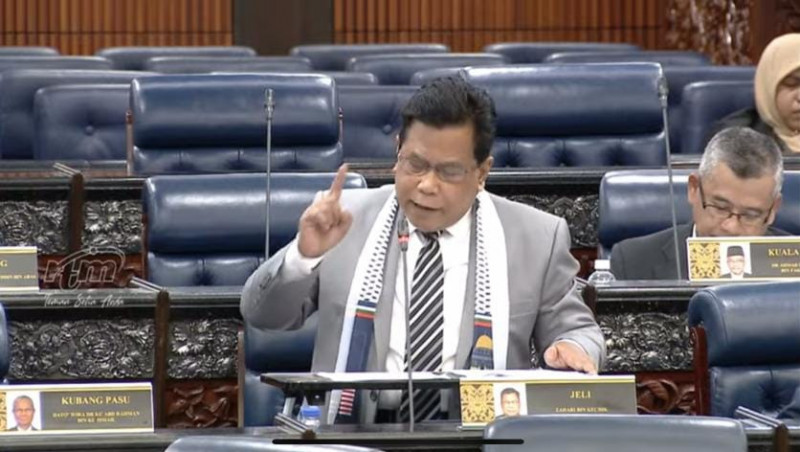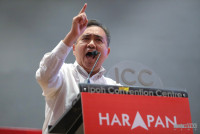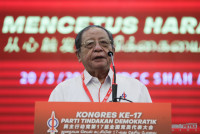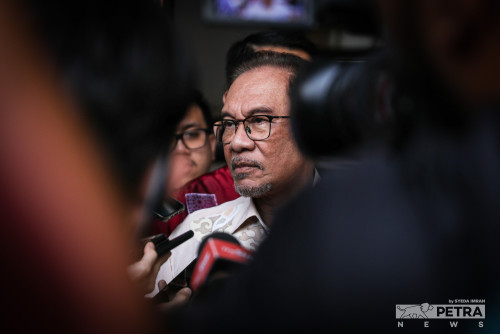THE RECENT CASCADE of Bersatu MPs pledging support to Prime Minister Datuk Seri Anwar Ibrahim has injected a fresh dose of complexity into Malaysia's political terrain.
While these shifts in loyalties are being framed as responses to immediate concerns faced by the rakyat – such as the rising cost of living and the need for more development in various constituencies – it has also opened a window for the public to get to a deeper glimpse of the situation within the political houses.
The latest to jump on the bandwagon is Jeli MP Zahari Kechik.
The Bersatu lawmaker has declared that his decision was voluntary and the result of his concern for the well-being of his constituents.
Zahari's move aligns with similar gestures from other Bersatu MPs like Datuk Mohd Azizi Abu Naim (Gua Musang), Datuk Suhaili Abdul Rahman (Labuan), and Datuk Iskandar Dzulkarnain Abdul Khalid (Kuala Kangsar) earlier in October.
These declarations have tilted the balance in Parliament, giving Anwar a more secure two-thirds majority.
This newfound strength could potentially empower the government to drive through crucial legislative changes, a significant advantage in the Malaysia political chessboard, which has seen much instability after the Sheraton Move.
On the other hand, the repercussions for the Perikatan Nasional (PN) opposition are palpable.
The loss of its parliamentary numbers stands out as the most immediate and consequential setback, while also diminishing PN's powerbase and making it susceptible to internal challenges, especially within Bersatu, which is best described as an offshoot of Umno.
Party functionality affected?
Within Bersatu, these political moves have triggered responses that illuminate the party’s internal dynamics.
The party’s deputy president Datuk Seri Ahmad Faizal Azumu recently publicly declared his loyalty to the PN and Bersatu. He has also distanced himself from the four who have thrown their support behind Anwar.
His statement comes in direct response to rumours circulating about his allegiance. This exposes underlying tensions and speculations within the party.
Internally, the cracks within Bersatu are becoming more apparent. The dissent within the party, underscored by the “defections”, raises serious questions about its internal cohesion.
The internal strife may prove detrimental to the party's functionality in the near future.
Beyond the immediate parliamentary arithmetic, the four MPs’ moves indicate a broader shift in political alliances and priorities.
Their decisions to align with Anwar signal a departure from rigid party loyalties to a more dynamic consideration of perceived public interests. This could set a precedent for further realignments, redefining political alliances in Malaysia.
Struggling to prevent fragmentation
Amid these developments, Umno Deputy President Datuk Seri Ahmad Zahid Hamidi has expressed optimism that more opposition MPs will rally behind Anwar. Yet, the situation is far from straightforward.
Other Bersatu MPs such as Ketereh’s Khlir Mohd Nor and Rompin’s Abdul Khalib Abdullah are adamant about their loyalty to Bersatu and the PN coalition. The situation in Bersatu currently can best be described as fluid and evolving.
This issue extends beyond mere declarations of support. These gestures are an indication of crumbling party discipline.
Iskandar and Suhaili have been suspended. It exposes the party's struggles with internal dissent and its efforts to maintain discipline among members to avoid further fragmentation.
The real test of the impact of these defections lies in the next general election as voter perception will play a crucial role.
Whether these moves are viewed as principled responses to the needs of constituents or as opportunistic manoeuvres driven by personal or political gain will be more fully seen in the next polls.
We must remember that voter perception is crucial in any democracy and support may swing either way.
The internal dynamics within parties, particularly Bersatu, will likely play a crucial role in shaping Malaysia's political future.
Political parties must grapple with this delicate balance of addressing the concerns of their lawmakers’ constituents and ensuring party discipline, while at the same time charting a course forward for effective roles either in the government or as an opposition. – The Vibes, November 10, 2023













